Theories of Punishment (PDF)
File information
Author: Owner
This PDF 1.7 document has been generated by Microsoft® Word 2016, and has been sent on pdf-archive.com on 16/06/2017 at 13:19, from IP address 103.222.x.x.
The current document download page has been viewed 830 times.
File size: 392.9 KB (20 pages).
Privacy: public file
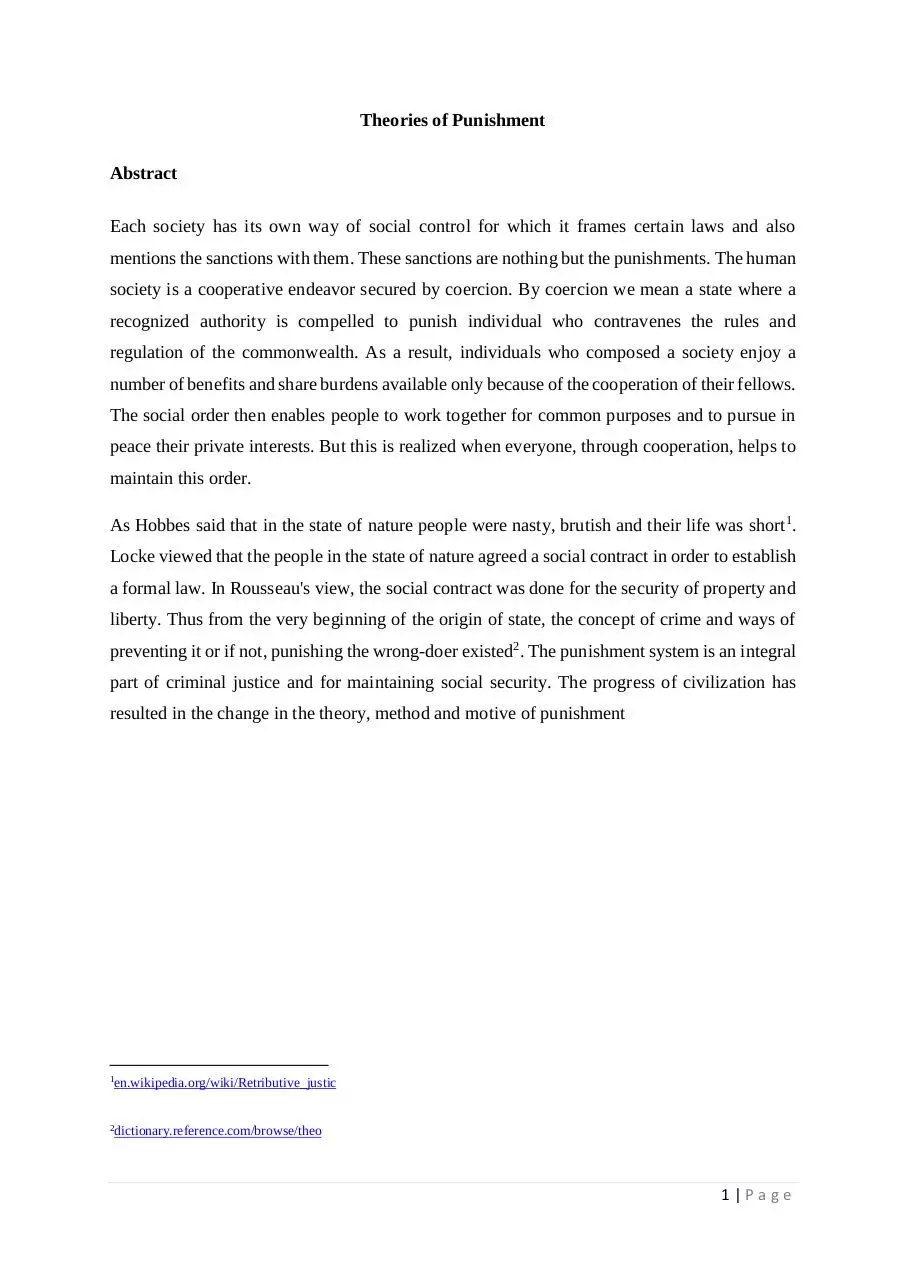
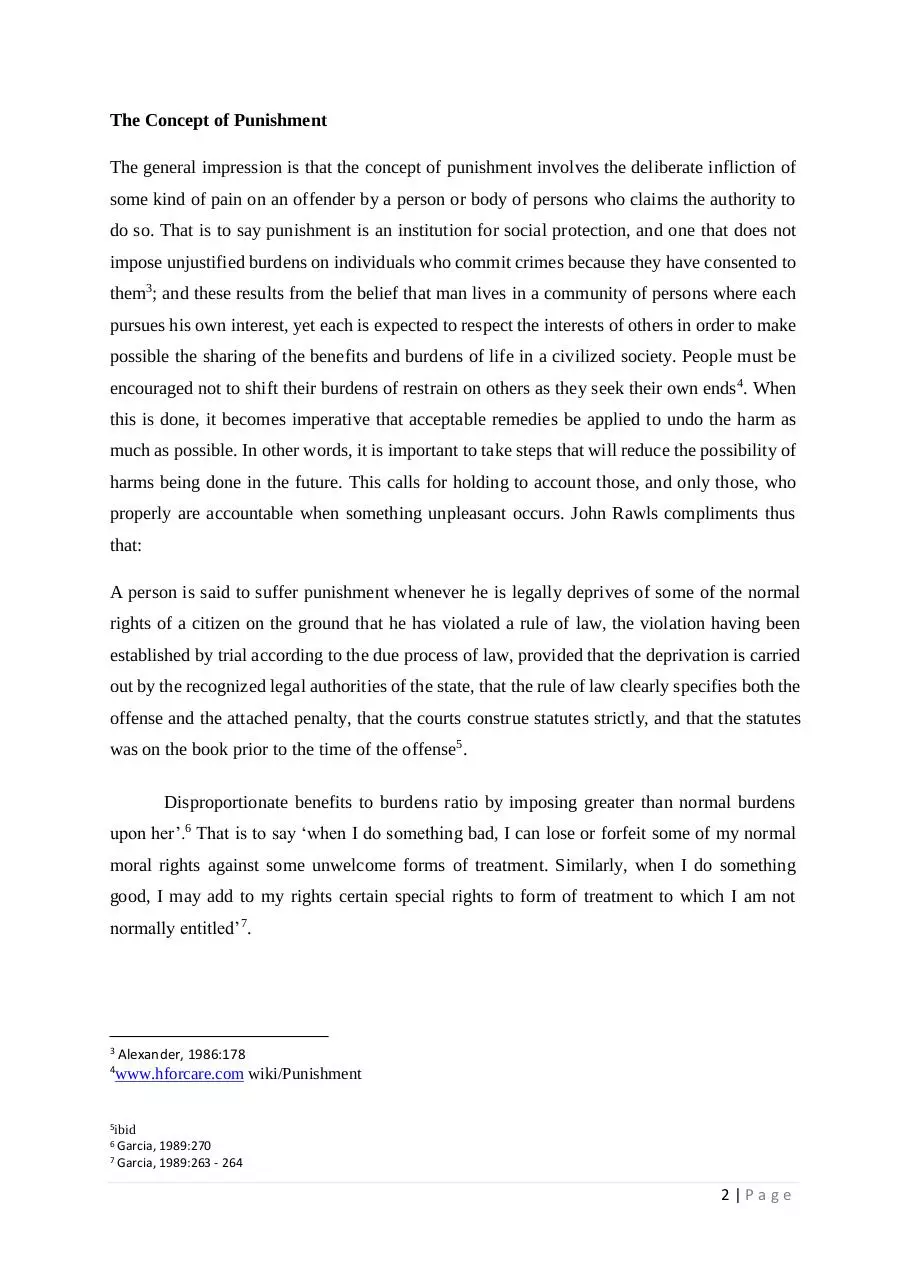
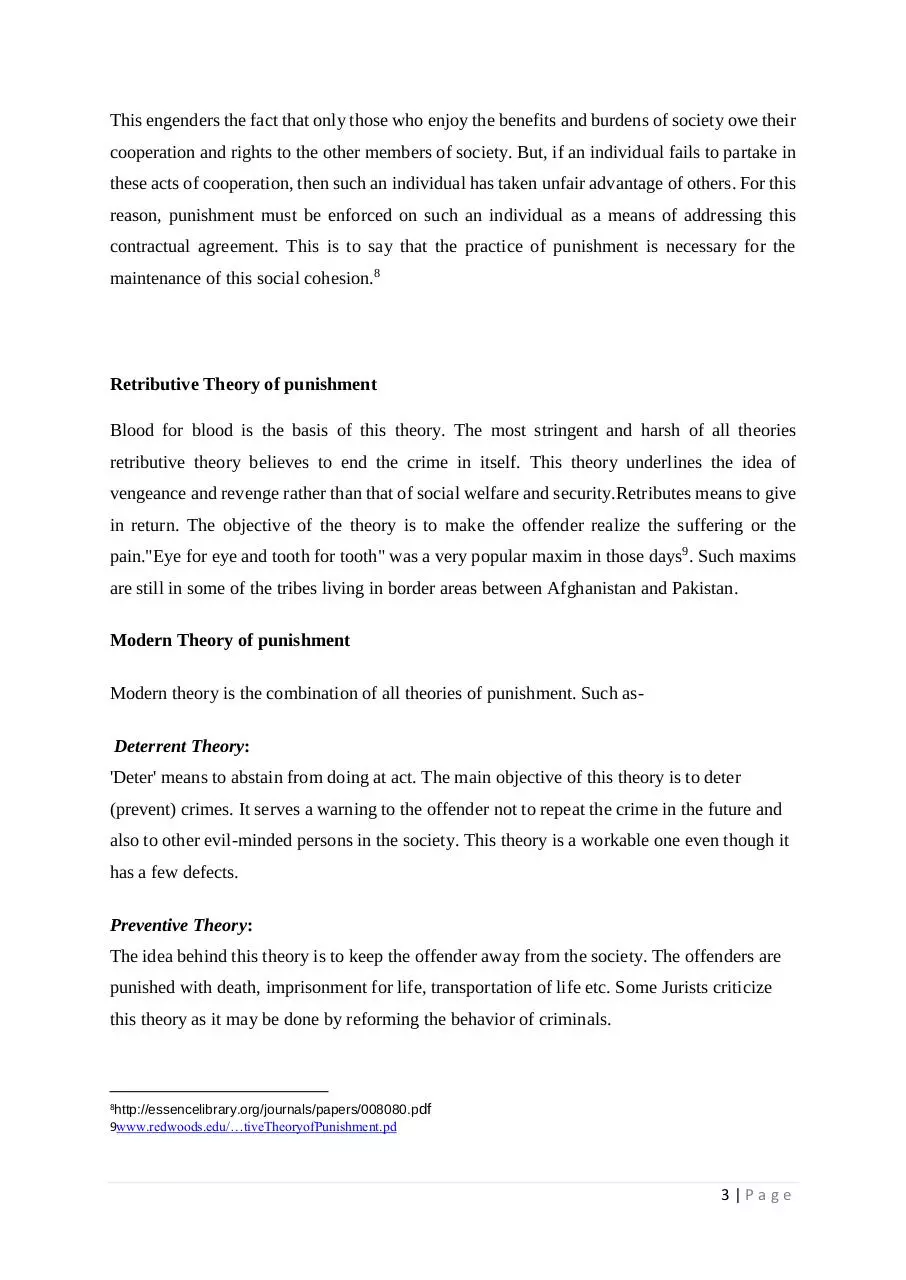
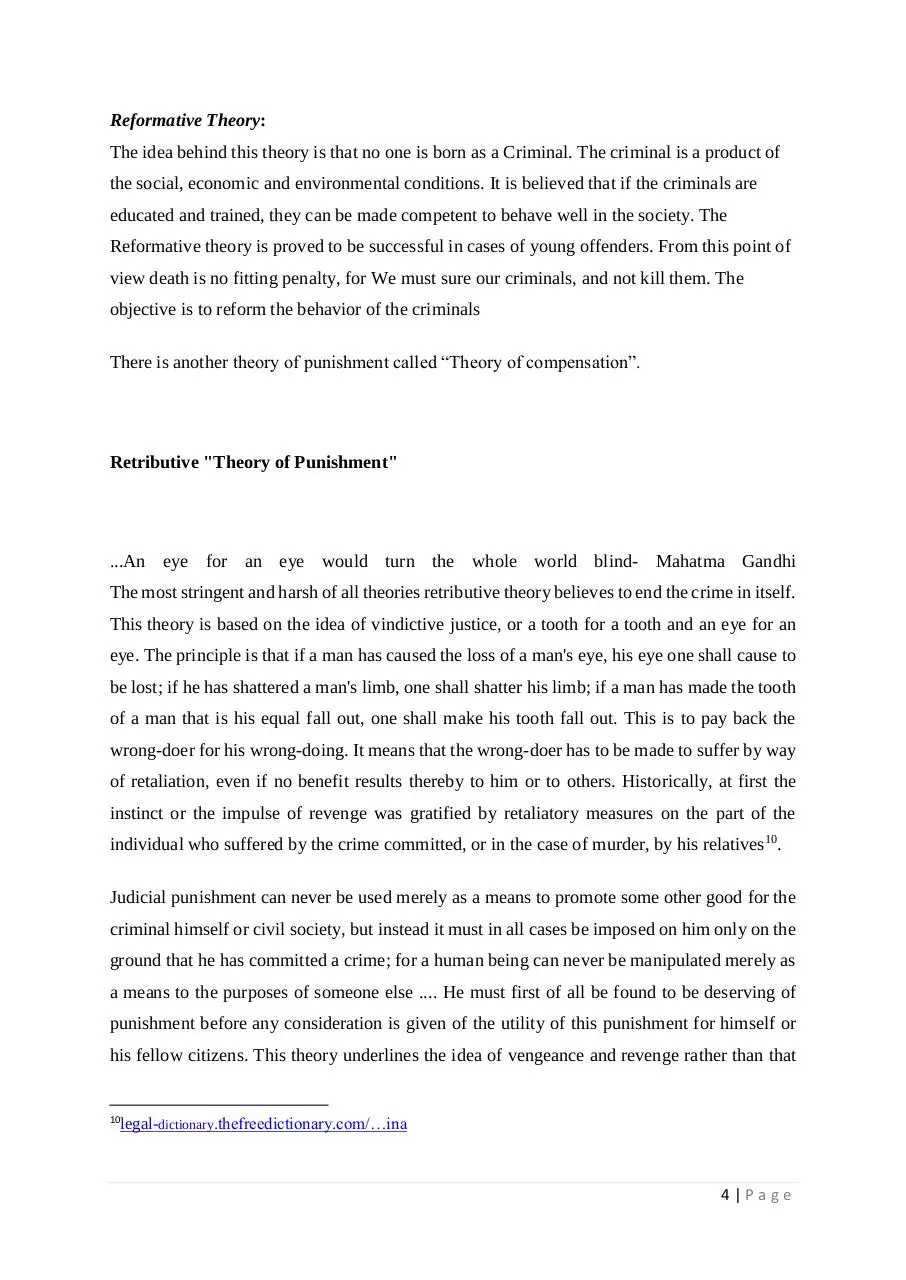
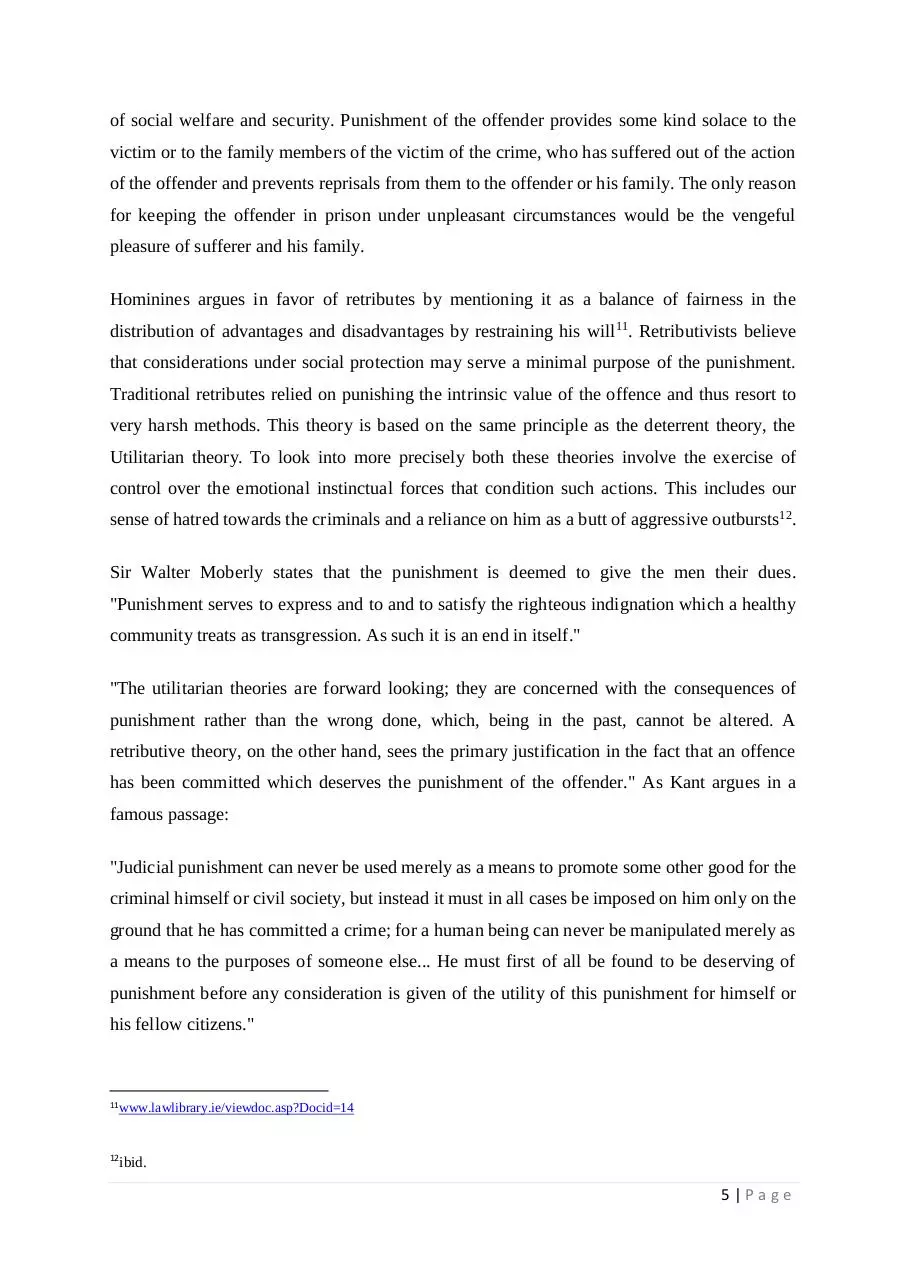
File preview
Theories of Punishment
Abstract
Each society has its own way of social control for which it frames certain laws and also
mentions the sanctions with them. These sanctions are nothing but the punishments. The human
society is a cooperative endeavor secured by coercion. By coercion we mean a state where a
recognized authority is compelled to punish individual who contravenes the rules and
regulation of the commonwealth. As a result, individuals who composed a society enjoy a
number of benefits and share burdens available only because of the cooperation of their fellows.
The social order then enables people to work together for common purposes and to pursue in
peace their private interests. But this is realized when everyone, through cooperation, helps to
maintain this order.
As Hobbes said that in the state of nature people were nasty, brutish and their life was short1.
Locke viewed that the people in the state of nature agreed a social contract in order to establish
a formal law. In Rousseau's view, the social contract was done for the security of property and
liberty. Thus from the very beginning of the origin of state, the concept of crime and ways of
preventing it or if not, punishing the wrong-doer existed2. The punishment system is an integral
part of criminal justice and for maintaining social security. The progress of civilization has
resulted in the change in the theory, method and motive of punishment
1en.wikipedia.org/wiki/Retributive_justic
2dictionary.reference.com/browse/theo
1|Page
The Concept of Punishment
The general impression is that the concept of punishment involves the deliberate infliction of
some kind of pain on an offender by a person or body of persons who claims the authority to
do so. That is to say punishment is an institution for social protection, and one that does not
impose unjustified burdens on individuals who commit crimes because they have consented to
them3; and these results from the belief that man lives in a community of persons where each
pursues his own interest, yet each is expected to respect the interests of others in order to make
possible the sharing of the benefits and burdens of life in a civilized society. People must be
encouraged not to shift their burdens of restrain on others as they seek their own ends 4. When
this is done, it becomes imperative that acceptable remedies be applied to undo the harm as
much as possible. In other words, it is important to take steps that will reduce the possibility of
harms being done in the future. This calls for holding to account those, and only those, who
properly are accountable when something unpleasant occurs. John Rawls compliments thus
that:
A person is said to suffer punishment whenever he is legally deprives of some of the normal
rights of a citizen on the ground that he has violated a rule of law, the violation having been
established by trial according to the due process of law, provided that the deprivation is carried
out by the recognized legal authorities of the state, that the rule of law clearly specifies both the
offense and the attached penalty, that the courts construe statutes strictly, and that the statutes
was on the book prior to the time of the offense5.
Disproportionate benefits to burdens ratio by imposing greater than normal burdens
upon her’.6 That is to say ‘when I do something bad, I can lose or forfeit some of my normal
moral rights against some unwelcome forms of treatment. Similarly, when I do something
good, I may add to my rights certain special rights to form of treatment to which I am not
normally entitled’7.
3
Alexander, 1986:178
4
www.hforcare.com wiki/Punishment
5ibid
6
7
Garcia, 1989:270
Garcia, 1989:263 - 264
2|Page
This engenders the fact that only those who enjoy the benefits and burdens of society owe their
cooperation and rights to the other members of society. But, if an individual fails to partake in
these acts of cooperation, then such an individual has taken unfair advantage of others. For this
reason, punishment must be enforced on such an individual as a means of addressing this
contractual agreement. This is to say that the practice of punishment is necessary for the
maintenance of this social cohesion.8
Retributive Theory of punishment
Blood for blood is the basis of this theory. The most stringent and harsh of all theories
retributive theory believes to end the crime in itself. This theory underlines the idea of
vengeance and revenge rather than that of social welfare and security.Retributes means to give
in return. The objective of the theory is to make the offender realize the suffering or the
pain."Eye for eye and tooth for tooth" was a very popular maxim in those days 9. Such maxims
are still in some of the tribes living in border areas between Afghanistan and Pakistan.
Modern Theory of punishment
Modern theory is the combination of all theories of punishment. Such asDeterrent Theory:
'Deter' means to abstain from doing at act. The main objective of this theory is to deter
(prevent) crimes. It serves a warning to the offender not to repeat the crime in the future and
also to other evil-minded persons in the society. This theory is a workable one even though it
has a few defects.
Preventive Theory:
The idea behind this theory is to keep the offender away from the society. The offenders are
punished with death, imprisonment for life, transportation of life etc. Some Jurists criticize
this theory as it may be done by reforming the behavior of criminals.
8http://essencelibrary.org/journals/papers/008080.p
df
9www.redwoods.edu/…tiveTheoryofPunishment.pd
3|Page
Reformative Theory:
The idea behind this theory is that no one is born as a Criminal. The criminal is a product of
the social, economic and environmental conditions. It is believed that if the criminals are
educated and trained, they can be made competent to behave well in the society. The
Reformative theory is proved to be successful in cases of young offenders. From this point of
view death is no fitting penalty, for We must sure our criminals, and not kill them. The
objective is to reform the behavior of the criminals
There is another theory of punishment called “Theory of compensation”.
Retributive "Theory of Punishment"
...An eye for an eye would turn the whole world blind- Mahatma Gandhi
The most stringent and harsh of all theories retributive theory believes to end the crime in itself.
This theory is based on the idea of vindictive justice, or a tooth for a tooth and an eye for an
eye. The principle is that if a man has caused the loss of a man's eye, his eye one shall cause to
be lost; if he has shattered a man's limb, one shall shatter his limb; if a man has made the tooth
of a man that is his equal fall out, one shall make his tooth fall out. This is to pay back the
wrong-doer for his wrong-doing. It means that the wrong-doer has to be made to suffer by way
of retaliation, even if no benefit results thereby to him or to others. Historically, at first the
instinct or the impulse of revenge was gratified by retaliatory measures on the part of the
individual who suffered by the crime committed, or in the case of murder, by his relatives10.
Judicial punishment can never be used merely as a means to promote some other good for the
criminal himself or civil society, but instead it must in all cases be imposed on him only on the
ground that he has committed a crime; for a human being can never be manipulated merely as
a means to the purposes of someone else .... He must first of all be found to be deserving of
punishment before any consideration is given of the utility of this punishment for himself or
his fellow citizens. This theory underlines the idea of vengeance and revenge rather than that
legal-dictionary.thefreedictionary.com/…ina
10
4|Page
of social welfare and security. Punishment of the offender provides some kind solace to the
victim or to the family members of the victim of the crime, who has suffered out of the action
of the offender and prevents reprisals from them to the offender or his family. The only reason
for keeping the offender in prison under unpleasant circumstances would be the vengeful
pleasure of sufferer and his family.
Hominines argues in favor of retributes by mentioning it as a balance of fairness in the
distribution of advantages and disadvantages by restraining his will11. Retributivists believe
that considerations under social protection may serve a minimal purpose of the punishment.
Traditional retributes relied on punishing the intrinsic value of the offence and thus resort to
very harsh methods. This theory is based on the same principle as the deterrent theory, the
Utilitarian theory. To look into more precisely both these theories involve the exercise of
control over the emotional instinctual forces that condition such actions. This includes our
sense of hatred towards the criminals and a reliance on him as a butt of aggressive outbursts12.
Sir Walter Moberly states that the punishment is deemed to give the men their dues.
"Punishment serves to express and to and to satisfy the righteous indignation which a healthy
community treats as transgression. As such it is an end in itself."
"The utilitarian theories are forward looking; they are concerned with the consequences of
punishment rather than the wrong done, which, being in the past, cannot be altered. A
retributive theory, on the other hand, sees the primary justification in the fact that an offence
has been committed which deserves the punishment of the offender." As Kant argues in a
famous passage:
"Judicial punishment can never be used merely as a means to promote some other good for the
criminal himself or civil society, but instead it must in all cases be imposed on him only on the
ground that he has committed a crime; for a human being can never be manipulated merely as
a means to the purposes of someone else... He must first of all be found to be deserving of
punishment before any consideration is given of the utility of this punishment for himself or
his fellow citizens."
11www.lawlibrary.ie/viewdoc.asp?Docid=14
12
ibid.
5|Page
"Kant argues that retribution is not just a necessary condition for punishment but also a
sufficient one. Punishment is an end in itself. Retribution could also be said to be the 'natural'
justification"13 , in the sense that man thinks it quite natural and just that a bad person ought to
be punished and a good person rewarded.
However 'natural' retribution might seem, it can also be seen as Bentham saw it, that is as
adding one evil to another, base and repugnant, or as an act of wrath or vengeance. Therefore,
as we consider divine punishment we must bear in mind, as Rowell says,
The doctrine of hell was framed in terms of a retributive theory of punishment, the wicked
receiving their just deserts, with no thought of the possible reformation of the offender. In so
far as there was a deterrent element, it related to the sanction hell provided for ensuring moral
conduct during a man's earthly life14.
The utilitarian theories are forward looking; they are concerned with the consequences of
punishment rather than the wrong done, which, being in the past, cannot be altered. A
retributive theory, on the other hand, sees the primary justification in the fact that an offence
has been committed which deserves the punishment of the offender. Thus the researcher
concludes that this theory closely related to that of expiation as the pain inflicted compensates
for the pleasure derived by the offender. Though not in anymore contention in the modern arena
but its significance cannot be totally ruled out as fear still plays an important role in the minds
of various first time offenders. But the researcher feels that the basis of this theory i.e.
vengeance is not expected in a civilized society. This theory has been severely criticized by
modern day penologists and is redundant in the present punishments.
Later, the state took away the right of retaliation from individuals because it was believed that
since the criminal has broken the law and hurt someone, he deserves to suffer. It was also
argued by those who were in favor of retribution that the victim of crime and/or his relatives
and friends will refuse to cooperate with society if the offender is not brought to justice. Thus,
assuming the function of revenge by the state really constituted the beginning of criminal law.
13
.msmary.edu/…Kant%20Retributive%20Theory.pd
14www.jstor.org/stable/202547
6|Page
Morris Cohen (see, Crime and Justice, Vol. II, op. cit., 1971: 27) has said that it is easy to
dismiss the retributive theory with the remark that it is a remnant of the barbaric conception of
vengeance. But the fact is that the early Greeks and many ancient spiritual books decried that
one has an obligation to avenge the killing of a kinsman.
The traditional code of honors still prevalent in many societies is that a gentleman must, at the
risk of life, resent an insult to the extent of seeking to remove it with the blood of the offender.
Even in the modern times, popular sentiment is that if a wife of a person is insulted or violated,
he need not wait for a policeman; it is his duty to knock the offender down. Such a view prevails
in almost all enlightened nations.
But the problem with the retributive theory is that it fails to suggest an acceptable criterion
whereby to discriminate between just and unjust punishment. Kant offers us the principle of
equality between the crime and the penalty. This sounds simple in the case of murder-a life for
a life. But it is obviously not capable of being extended.
Morris Cohen (ibid. 28) asks: can crime and punishment really be equated? What penalty can
equal the crime of rape, kidnapping, forgery, dishonesty and so on? For the state to exercise
the same amount of brutality against the criminal that the criminal exercised against his victim
would be demoralizing to any community15.
This theory of vengeance was, however, rejected with the ingress of the idea of refinement and
the humanizing of society. It came to be argued that the passion of revenge cannot be allowed
to drive out reason.
The feeling of retaliation will create demand for making punishment as severe as possible. It
will only array man against man. The idea of treatment of criminals on the other hand will place
a premium upon violence against criminals.
Besides, in modern society, neither the victims of crime support the idea of physical torture of
criminals nor the public opinion would tolerate sanguinary methods of punishment. In fact,
now the popular demand is to eliminate all methods of punishment that cause physical
suffering. The idea of doing away with severe punishment for taking revenge does not mean
15
www.philosophy.ox.ac.uk/…cture_6_handout.do
7|Page
that the offender will escape all pain. Punishment will be awarded to the criminal but it would
be devoid of the idea of vengeance.
The argument is that if a criminal is not punished, the public would feel frustrated and its
obedience of the law would appear meaningless. Punishment of criminals would help to unify
society against crime and criminals and also maintain respect for law. If law-violators and lawconformists receive the same treatment, there would be no reason to abide by the law.
Thus, punishment of the criminal will make people rally in support of law enforcement,
encourage them in their fight against crime, and help the authorities to maintain the public
sense of justice. Today, not only the idea of revenge in punishment is rejected but even the idea
of punishing the offenders is criticized by many scholars. The argument that is most accepted
is that we should hate the crime but not the criminal.
There are many ways for achieving social solidarity. What is needed is the measures designed
to prevent crime. The idea of retribution is to be totally rejected. Further arguments against
retribution are:
1. It is now scientifically established through various empirical studies that the functioning of
social systems and social structures is more responsible for crime than individual himself. As
such, would it be logical to give retributive punishment to those who commit crimes due to
force of circumstances rather than their personality traits?
2. Protecting the interests of criminals is as important today as protecting the interests of society
or the victims. The punishment should therefore be proportional to the loss incurred.
3. The present society stresses humanitarianism and scientific progress. The movement in such
a society should be to prevent crime rather than make criminal suffer, which is largely
repressive.
4. Since almost all prisoners return to society, it is necessary that they must not be so
stigmatized that they cannot take up lawful pursuits upon their release. Retributive punishment
only makes criminals confirmed enemy of society.
8|Page
5. Religious conscience and moral and ethical principles have always emphasized the
importance of forgiveness, pity, mercy, charity, and considered these values as supreme values.
It is, therefore, only moral and proper to pardon the criminal.
6. Holding that if society fails to punish the offender, the victim and his relatives may take the
law in their own hands is not correct. Today, the victims of crime tend to shrink from the idea
of subjecting criminals to physical torture. In fact, the victim feels satisfied if his loss is restored
or he is properly compensated. He disregards the causes that produce a criminal or the measures
adopted for dealing with criminals.
7. Resorting to the argument that a person can be prevented from indulging in crime by
awarding him retributive punishment is invalid. Mackenzie has stated that it is only when an
offender sees the punishment of his crime to be the natural or logical outcome of his act that
he is likely to be led to any real repentance and it is only this recognition that is likely to lead
others to genuine abhorrence of crime.
In spite of these arguments, it may be pointed out that though reformation and in some cases
deterrence receive more attention, yet retribution too continues to remain one of the purposes
of punishment.
There are cases where retributive punishment is still considered necessary. The retributive
punishment of imposing death penalty on offenders like Range and Bilal in Delhi who had
killed Chopra children was not condemned by society, nor has the retributive punishment to
the terrorists of Punjab and Kashmir who had killed a large number of innocent persons of all
religions Hindus, Sikhs, and Muslims been described as severe and unjustified.
Rather, people look forward to having such offenders punished severely. It is in such cases of
crime that retribution stands out distinctly as a purpose of punish.
Criticism of Retributive Theory
This theory of punishment is very cruel and inhuman. It does not seem to be fit for human
beings. It is fit only for unclosed people or animals. These days no individual enjoys the right
to avenge the murderer of his relative. The state conducts the trial and permits the relative to
9|Page
Download Theories of Punishment
Theories of Punishment.pdf (PDF, 392.9 KB)
Download PDF
Share this file on social networks
Link to this page
Permanent link
Use the permanent link to the download page to share your document on Facebook, Twitter, LinkedIn, or directly with a contact by e-Mail, Messenger, Whatsapp, Line..
Short link
Use the short link to share your document on Twitter or by text message (SMS)
HTML Code
Copy the following HTML code to share your document on a Website or Blog
QR Code to this page

This file has been shared publicly by a user of PDF Archive.
Document ID: 0000613188.